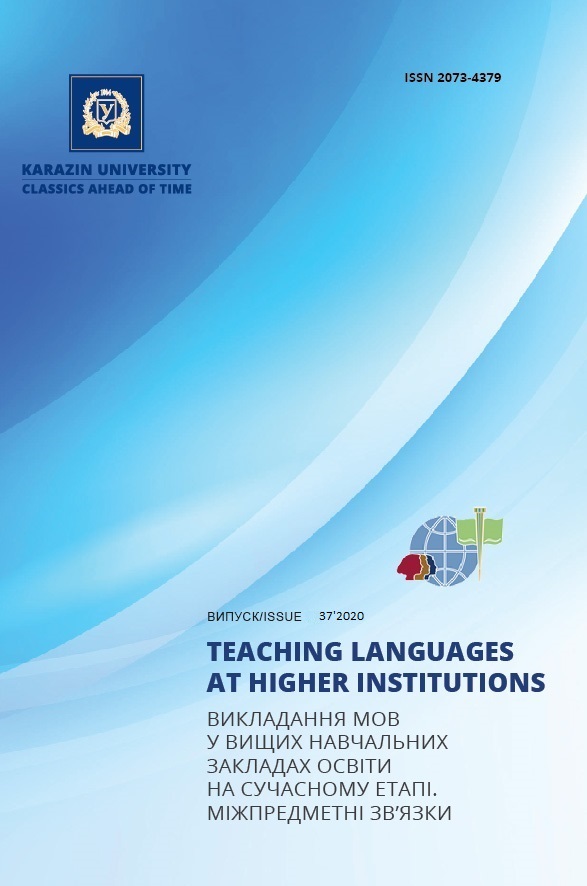Application of contextual approach to teaching English for special purposes in higher military educational institutions
Abstract
The article is dedicated to substantiating the reasons for applying a contextual approach to teaching English for special purposes (ESP) in higher military educational institutions. Even though future officers of the Armed Forces of Ukraine should meet severe requirements as to the level of English language acquisition, when English teachers enter an ESP classroom in a military university, they meet a lot of low-skilled students with a lack of motivation. The students can be afraid of expressing themselves in a foreign language; sometimes they are afraid, stressed, unwilling to speak up because they may not see any necessity in doing so.
That’s why at ESP lessons teachers should focus not only on the subject-matter of the course but also increase students’ motivation, create a positive atmosphere, develop critical thinking and professional competence, encourage group work for reaching mutual goals. All above mentioned poses a challenge to the teacher, and the solution can be in applying a contextual approach to teaching English for special purposes that implies contextualization of materials to create true-to-life situations and submerge the students into job-related surrounding making them think about their previous experience and ways of its application under different circumstances.
The article generalizes the practical experience of using contextualized materials at the English lessons for special purposes and proves that they help to create a meaningful environment for learners. As the result the students demonstrate an eagerness to express themselves using a foreign language, they are involved in the lesson and ready to work in a team.
So, using contextualized materials at the English lessons for special purposes in higher military educational establishments is an up-to-date issue, as it helps to form necessary language competence of future officers, create additional motivation, and involve students in job-related activities.
Downloads
References
Verbitskiy, A.A. (1991). Aktivnoe obuchenie v vyisshey shkole: kontekstnyiy pohod [Active learning in institutions of higher education: contextual approach]. Moscow: Vysshaya shkola [in Russian].
Vyshnevska, K. (2013). Kontekstne navchannia inozemnoi movy yak chynnyk uspishnosti formuvannia profesiinoi kompetentsii maibutnikh fakhivtsiv ekonomichnoho profiliu [Context teaching and learning as a stimulus for forming professional competence of future specialists of economic sphere]. Problemy Pidhotovky Suchasnoho Vchytelia [Issues of preparation of a contemporary teacher], 8 (Part 2), pp. 143–151 [in Ukrainian].
Melnyk, A. (2012). Kontekstne navchannia u protsesi profesiinoho inshomovnoho spilkuvannia studentiv nemovnykh spetsialnostei [Contexual training in the process of professional foreign language communication of non-philological students]. Vytoky Pedahohichnoi Maisternosti. Seriia: Pedahohichni Nauky [The sources of pedagogical skills. Series: Pedagogical studies], vol. 10, pp. 191–196 [in Ukrainian].
Herliand, T. (2015). Osoblyvosti vprovadzhennia tekhnolohii kontekstnoho navchannia u zakladakh profesiino-tekhnichnoi osvity [Features of the introduction of the contextual teaching technology in institutions of vocational education]. Naukovyi visnyk Instytutu profesiino-tekhnichnoi osvity. Profesiina pedahohika [Scientific Bulletin of the Institute of Vocational Education. Professional pedagogy], 10, pp. 84–88 [in Ukrainian].
Kovtun, O.V. Kontekstnyi pidkhid yak metodolohichnyi kontsept formuvannia profesiino-movlennievoi diialnosti maibutnikh aviatsiinykh operatoriv [Contextual approach as a methodological concept of forming professional and language competence of future aviation operatiors]. Available at: https://er.nau.edu.ua/handle/NAU/10673?mode=full [Accessed 30 Aug. 2020] [in Ukrainian].
Rybiak, V. and Koval, A. (2020). Profesiino adaptovani komunikatyvni vpravy na zaniattiakh z anhlomovnoi pidhotovky aviatsiinykh fakhivtsiv [Professionally-related communicative exercises at ESP lessons for aviation specialists]. Aktualni pytannia humanitarnykh nauk [Current issues of the humanities]. Drohobych: Vydavnychyi dim “Helvetyka”, 31, Vol. 4, pp. 86-93 [in Ukrainian]. DOI: http://doi.org/10.24919/2308-4863.4/31.214303.
Rybiak, V. and Revutska, S. (2020). Kontekstnyi pidkhid do vykladannia anhliiskoi movy profesiinoho spriamuvannia [Contextual approach to teaching English for special purposes]. International scientific and practical conference: Current trends and factors of the development of pedagogical and psychological sciences in Ukraine and EU countries, September 25-26, 2020. Lublin, Poland, Part 2, pp. 173–177 [in Ukrainian]. DOI: http: /doi.org/10.30525/978-9934-588-80-8-2.44.
Berns, R.G. and Erickson, P.M. (2001). Contextual Teaching and Learning: Preparing Students for the New Economy. The Highlight Zone: Research @ Work No. 5. Columbus, OH. Available at: https://files.eric.ed.gov/ fulltext/ ED452376.pdf [Accessed 17 February 2020] [in English].
Perin, D. (2011). Facilitating Student Learning Through Contextualization. Assessment of Evidence Series. CCRC Working Pape,r No. 29. New York: Columbia University. Available at: https://ccrc.tc.columbia.edu/media/k2/ attachments/facilitating-learning-contextualization-working-paper.pdf [Accessed 16 February 2020] [in English].
Sears, S. (2003). Introduction to Contextual Teaching and Learning. Bloomington, Indiana. Available at: http://teacherlink.ed.usu.edu/ yetcres/catalogs/reavis/ 504.pdf [Accessed 05 June 2020] [in English].
Mellor-Clark S. (2005). Campaign. Students’ book 2. Macmillan Publishers Limited [in English].

